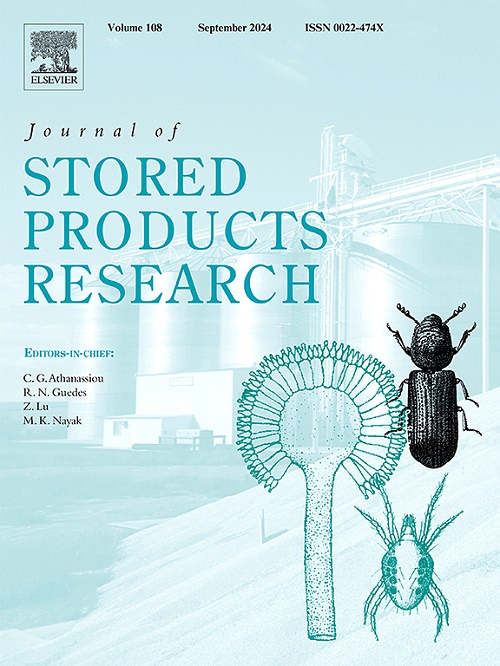水杨酸甲酯作为一种剂量依赖性熏蒸剂防治常见储藏产品害虫:一项比较实验室研究
IF 2.7
2区 农林科学
Q1 ENTOMOLOGY
引用次数: 0
摘要
储藏产品有害生物对全球粮食安全构成重大威胁,导致农产品遭受重大经济损失。传统上由合成杀虫剂控制,这些害虫已经产生了抗药性,引起了环境和健康方面的关注,促使人们寻找替代战略。在这项研究中,我们评估了水杨酸甲酯(MeSa)的效果,水杨酸甲酯(MeSa)是一种天然存在的化合物,具有几种很有前景的害虫防治性能,对三种储藏产品害虫:米象(Sitophilus oryzae)、castaneum Tribolium castaneum和Trogoderma granarium。在放置成人的120毫升容器中进行了2至10毫克剂量的熏蒸,进行了实验室生物测定,以评估死亡率。结果表明,不同物种之间的死亡率存在剂量依赖性差异。处理48h后,MeSA对Tro有较强的杀虫活性。在所有测试剂量中达到80%以上的死亡率。Castaneum表现出剂量依赖性反应,10 mg死亡率约为70%。相比之下,米曲霉表现出有限的易感性,在最高剂量10 mg时死亡率达到37%左右。这种物种间易感性的差异强调了物种特异性评估的重要性。总的来说,这项研究的结果突出了MeSA作为合成杀虫剂,特别是Tro的可持续替代品的潜力。granarium。本研究鼓励进一步研究MeSA的作用机制和田间药效,以评价其在有害生物防治战略中的可能应用。本文章由计算机程序翻译,如有差异,请以英文原文为准。
Methyl salicylate as a dose-dependent fumigant against common stored product pests: A comparative laboratory study
Stored product pests pose a significant threat to global food security, leading to substantial economic losses in agricultural commodities. Traditionally controlled with synthetic pesticides, these pests have developed resistance, raising environmental and health concerns, driving the search for alternative strategies. In this study, we assessed the effect of methyl salicylate (MeSa), a naturally occurring compound with several promising properties for pest control, against three stored product pest species: Sitophilus oryzae, Tribolium castaneum and Trogoderma granarium. Laboratory bioassays were conducted to assess mortality rates by fumigation across doses ranging from 2 to 10 mg in 120 mL containers where adults were placed. The results demonstrated dose-dependent variations in mortality among the species. After 48h from the treatment MeSA demonstrated strong insecticidal activity against Tro. granarium, achieving over 80 % mortality across all tested doses, while Tri. castaneum showed a dose-dependent response, reaching approximately 70 % mortality at 10 mg. In contrast, S. oryzae exhibited limited susceptibility, with mortality peaking at around 37 % at the highest dose of 10 mg.This variation in susceptibility among species underscores the importance of species-specific evaluations. Overall, the findings of this study highlight the potential of MeSA as a sustainable alternative to synthetic insecticides, particularly to Tro. granarium. This study encourages further investigation of the mechanisms of action and field efficacy of MeSA to evaluate its possible application in pest management strategies.
求助全文
通过发布文献求助,成功后即可免费获取论文全文。
去求助
来源期刊
CiteScore
5.70
自引率
18.50%
发文量
112
审稿时长
45 days
期刊介绍:
The Journal of Stored Products Research provides an international medium for the publication of both reviews and original results from laboratory and field studies on the preservation and safety of stored products, notably food stocks, covering storage-related problems from the producer through the supply chain to the consumer. Stored products are characterised by having relatively low moisture content and include raw and semi-processed foods, animal feedstuffs, and a range of other durable items, including materials such as clothing or museum artefacts.

 求助内容:
求助内容: 应助结果提醒方式:
应助结果提醒方式:


